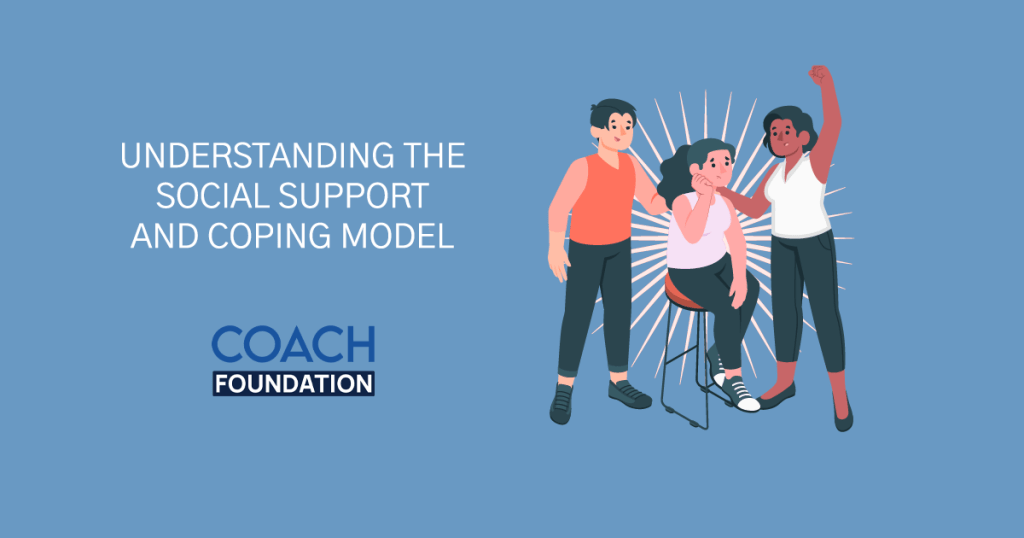Blog » Coaching Models and Techniques » Understanding The Social Support And Coping Model
Understanding The Social Support And Coping Model
Are you looking to understand the Social Support and Coping model? Well, look no further because this article is here to help you out!In today’s fast-paced world, it’s essential to have a strong support system and effective coping strategies in place. The Social Support and Coping model aims to provide individuals with the tools they need to navigate life’s challenges successfully

So why is social support so important? Let me tell you. Having a network of people who genuinely care about your well-being can make all the difference when facing difficult situations.
Key Takeaways
1. Social support and coping strategies are crucial in navigating life’s challenges
2. Social support from a network of caring individuals reduces stress levels and improves mental well-being
3. The Social Support and Coping model emphasizes seeking and receiving support from others
4. Coping strategies like deep breathing, physical activity, mindfulness, and meditation enhance resilience and stress management
5. Incorporating social support and coping strategies in coaching can empower individuals to handle stress effectively and foster personal growth
So, let’s get started!
What is the Social Support and Coping model?
The Social Support and Coping model explores how you navigate challenges with the help of your social networks. It recognizes that facing difficulties alone can be overwhelming, but having supportive relationships can make a significant difference in how you cope.
In this model, social support refers to the assistance, guidance, and comfort you receive from your family members, friends, colleagues, or other individuals in your social network.
Leading experts in the field agree that it can come in various forms, such as emotional support (listening and providing empathy), instrumental support (practical assistance), informational support (providing advice or resources), or appraisal support (providing feedback on your situation). These different types of support can help you feel understood, validated, and more equipped to face challenges.
Social support is important because it enhances your ability to cope effectively with stressors. When you have a strong network of supportive people around you, it provides a buffer against the negative effects of stress. Knowing that there are people who care about you and are willing to listen and offer help can alleviate feelings of isolation and loneliness.
What are Coping Strategies?
Explore and utilize various coping strategies to enhance your ability to manage stressors in life without feeling overwhelmed. Coping strategies are the actions you take to deal with stressful situations or emotions. They can be both healthy and unhealthy, so it’s important to choose strategies that promote your well-being.
Some common coping strategies include deep breathing exercises, engaging in physical activity, practicing mindfulness or meditation, talking to a trusted friend or family member, and journaling. By incorporating these strategies into your daily routine, you can better navigate the challenges that come your way.
1. Deep breathing exercises
They are an effective coping strategy that can help reduce anxiety and promote relaxation. Taking slow, deep breaths helps activate the body’s natural relaxation response and calms the mind.
Deep breathing exercises, like Box Breathing (inhale, hold, exhale, pause – all for four seconds each), Belly Breathing (breathe deeply into your belly while keeping your chest still), and 4-7-8 Breathing (inhale for 4 seconds, hold for 7, exhale for 8), can help manage stress and promote relaxation.
2. Engaging in physical activity
It is another great way to cope with stress as it releases endorphins, which are known as the ‘feel-good’ hormones. Whether it’s going for a walk, doing yoga, or playing a sport you enjoy, physical activity can provide an outlet for pent-up stress and tension.
3. Practicing mindfulness or meditation
It is also beneficial for managing stressors. Mindfulness involves being fully present in the moment without judgment. It allows you to observe your thoughts and emotions without getting caught up in them.
Meditation involves focusing your attention on a specific object or mantra while letting go of distracting thoughts. Both practices cultivate a sense of calmness and clarity amidst chaos.
Social Support and Coping Model Application in Coaching
Incorporating social connections into your coaching journey can revolutionize how you navigate and conquer stress, empowering you to achieve newfound resilience and support.
Drawing from my experience, the social support and coping model provides a framework for understanding the positive impact of social interactions on our ability to cope with challenges. By actively seeking out and nurturing supportive relationships, you can enhance your coping strategies and improve your overall well-being.
One way in which the social support and coping model can be applied in coaching is by encouraging clients to build a strong network of supportive individuals. BThis could involve identifying existing relationships that provide emotional support, such as friends or family members, or actively seeking out new connections through group activities or support groups.
By fostering these relationships, clients can create a sense of belonging and find comfort in knowing they have people they can turn to during difficult times.
Additionally, coaches can help clients develop effective communication skills that enable them to express their needs and seek support from others. This may involve teaching assertiveness techniques or providing guidance on how to ask for help when it’s needed.
By improving their ability to communicate effectively, clients are better equipped to engage with their social network in a way that promotes understanding, empathy, and ultimately enhances their ability to cope with stress.
Incorporating the principles of social support and the coping model into coaching can have transformative effects on an individual’s ability to navigate stress. By fostering supportive relationships and developing effective communication skills, clients can tap into a vast reservoir of resilience and strength.
As you move forward in your coaching journey, remember the power of connection to help you overcome challenges and achieve lasting personal growth without losing sight of who you truly are.
Conclusion
So, now you understand the Social Support Evaluation Model! You’ve learned about its components and how it can benefit your research. But like any model, there are also challenges to applying it.
While there may be some difficulties in implementing the model, its potential benefits make it a valuable tool for those interested in studying social support. So, go ahead and give it a try – you might be surprised at what you discover!
Understanding the Social Support Evaluation Model is vital for those who want to assess and improve social support in their communities or organizations. Through this model, you’ll be able to identify gaps in social support and develop interventions that address these issues. Keep in mind that while there may be challenges along the way, the benefits of using this model far outweigh any difficulties.
Frequently Asked Questions (FAQs)
What is the social support and coping model?
The social support and coping model helps you navigate difficult times by providing emotional comfort and practical assistance from your loved ones. This model recognizes that having a strong support system is crucial for your well-being during challenging situations.
When you face adversity, having people who care about you can help alleviate stress, reduce feelings of loneliness, and provide a sense of belonging. Emotional support from friends, family, or even online communities can offer a safe space to express your thoughts and emotions without judgment.
What are some proven workplace coping strategies?
One effective way to navigate difficult times is by incorporating proven coping strategies into your life. These strategies can help you better manage stress, regulate emotions, and maintain a positive mindset.
Practicing mindfulness and relaxation techniques, such as deep breathing exercises or meditation.
Seeking social support, and connecting with others who understand and empathize with your situation can provide emotional validation and encouragement.
Engaging in physical activity has been shown to be an effective coping strategy. Exercise releases endorphins, which boost mood and reduce stress levels.
Can social support and coping strategies be taught to clients in coaching?
Clients in coaching can learn effective ways to navigate difficult times by incorporating social support and coping strategies into their lives, creating a strong foundation for managing stress and maintaining a positive mindset.
Here are some ways that social support and coping strategies can be taught to clients:
Encourage clients to establish a support network
Teach problem-solving skills
Promote self-care practices
Provide tools for reframing negative thoughts
Foster accountability

ABOUT SAI BLACKBYRN
I’m Sai Blackbyrn, better known as “The Coach’s Mentor.” I help Coaches like you establish their business online. My system is simple: close more clients at higher fees. You can take advantage of technology, and use it as a catalyst to grow your coaching business in a matter of weeks; not months, not years. It’s easier than you think.
AS SEEN ON





